Italian Contacts
There were 5 contacts in Italy from whom we
received children for holidays. Don Mario Rocchi of Modena,
Mario Borrelli from Naples, Danilo Dolci from Partinico, Sicily,
Professor Longo Vito Santo from Alberobello in Apulia, and Eileen Walters who
had contacts in Carinari Refugee camp near Naples from where we received
Tunisian refugees. Journeys transporting the children by rail
accross Europe could be chaotic and some stories of these may be found on this
link - Italian
anecdotes - along with accounts of how several of the children were managed
when they came to live in foster families
THE STORY OF MODENA
(written in 1965)
During the last war a certain Major
Lewis, British Army Officer who had been captured in Italy, was being
transported to the nearest camp when the train conveying him
fortuitously stopped at Modena. By a remarkable chance, with the help
of a signalman and members of the Italian Resistance Movement, he
managed to escape here. It was this same man who in 1956 introduced
I.H.C. to Monsignor Mario Rocchi and the "Boys' Town" of
Modena. Monsignor Rocchi and his colleague,, Don Monari,
had been involved in the Italian Resistance and had saved many British
lives. It was their ambition to form in Modena, when the war ended,
somewhere to enable children of poor families to obtain technical
training in various subjects. In fact Don Monari was caught
and executed by a Nazi firing squad, but Monsignor Rocchi with the
support of some of the British Officers whose lives he had saved,
founded the "Citta dei Ragazzi". To-day the "Citta" offers
a free training to over four hundred boys who could not normally get
such education. There are facilities for learning to repair cars and
televisions, to weld, to engineer, and so on; moreover Monsignor Rocchi
is himself an expert in all mechanical procedures. Besides the school,
there are also social and sporting activities similar to those in the
Boys' Clubs at present being popularized in England
In fact Citta dei Ragazzi
still flourishes now (in 2007) and Don Mario Rocchi is still alive although
unfortunately in rather poor health.
THE STORY OF NAPLES
Mario Borrelli who sadly died in 2007, was
introduced to us by Mario Rocchi. His work in Naples is well
documented. Originally he was a priest but later he left the
priesthood and married. These extracts are from contemporary articles but
I have also included the address I gave at the Mario Borrelli memorial service
in Oxford and some follow up from that.
(written in 1968)
The books Children of the Sun and Father
Borrelli's autobiography A Street Lamp and the Stars were written
about the Naples of the early *fifties". At this time Naples was seething with
homeless and unemployed, victims of post-war depression, and in consequence
of this, the city was full of crime and disease. Up to 1960 Father Borrelli
had concentrated almost exclusively oh caring for abandoned boys in his ruined
church at Materdei, but at this point, the Casa degli Scugniz zi as it was called
being well established, he turned
his attention to a very much bigger problem which had insidiously arisen. Slums had been rife in
Naplcs,
and the State in a rather feeble attempt to got to grips with the
problem had delineated them into nine separate areas and built a wall
around each. Father Borrolli had always spent a lot of time in these
"baracche" as they are called, and frequently slept there, but it was
not until after 1960 that he began, by measures verging on civil
disobedience, to push the State into rehousing their occupants. This
work still goes on, but five areas have alrendy been
cleared. In Naples today there is less crime, less disease,
probably less unemployment and less homelessness. However, there are
still a large number of problems athough they arc not so dramatic in
nature. Rehousing itself is a problem, for frequently
these people have never had to keep a house before and have little idea
how to set about it. Families still have too many children many have no
alternative but to pass their daily lives hanging about the streets.
Schools are overcrowded and attendance is often irregular. . It is not
unknown for families to rent out their new flats while they themselves
returned to living in the slums.
zi as it was called
being well established, he turned
his attention to a very much bigger problem which had insidiously arisen. Slums had been rife in
Naplcs,
and the State in a rather feeble attempt to got to grips with the
problem had delineated them into nine separate areas and built a wall
around each. Father Borrolli had always spent a lot of time in these
"baracche" as they are called, and frequently slept there, but it was
not until after 1960 that he began, by measures verging on civil
disobedience, to push the State into rehousing their occupants. This
work still goes on, but five areas have alrendy been
cleared. In Naples today there is less crime, less disease,
probably less unemployment and less homelessness. However, there are
still a large number of problems athough they arc not so dramatic in
nature. Rehousing itself is a problem, for frequently
these people have never had to keep a house before and have little idea
how to set about it. Families still have too many children many have no
alternative but to pass their daily lives hanging about the streets.
Schools are overcrowded and attendance is often irregular. . It is not
unknown for families to rent out their new flats while they themselves
returned to living in the slums.
(memorial address 2007)
We
first gave holidays to the Scugnizzi in 1960 and over the next 10 years 390
stayed with families in such towns as Birmingham, Portsmouth, Kettering and
Merthyr Tydfil, to name just a few . One, Vincenzo, stayed on in England to
become a chef.
Mario wrote to us following one such visit:- “Our fears about sending the shanty
town children to England were quite unjustified and the holiday could not be
more successful. At first it was difficult to get a party of children together
as the parents were afraid and a little suspicious. Now however it is quite
the reverse and they are always asking when the next holiday is going to be
arranged. I feel these holidays are very good for the children, but they
probably need particularly patient and understanding foster parents. Saints
preferably”
The
children were transported by train and the journeys, of which I made several
were hair raising. Trains were missed, the Neapolitans had no idea of
punctuality of course, Italian trains frequently ran late sometimes with good
reason as in 1965 when there was a typhoon in the alps; and of course there was
little discipline amongst the Scugnizzi, but we managed without any serious
incident. At
that time Mario was sleeping in the baracche (shanty towns). There were nine
of these shanty towns and one by one he would move into a crude hut in one, get
to know the people and when he had got their trust, put pressure on the
authorities to rehouse them. Although Mario’s relationship with the church
was always a bit fraught, the secular authorities did seem willing to act, and
by 1966 when I went out to Naples he had managed to get 4 of the baracche
cleared and was sleeping in a 5th one which he took us to. He was
always most hospitable and took great trouble to show us round and explain his
work. He also had a great sense of humour such as when he offered us our pasta
with “poisonous mushrooms”. In those days the Casa dello Scugnizzo was no more
than an old church and a few surrounding rooms.
Mario told us a lot about the children he helped:- These are his words.
Enzino’s father is seldom at home as he is wanted by the police. (He drives
without a licence). His mother has a bad leg and although she sometimes looks
after other people’s children she has frequently been unable to raise enough
money for food.
In
Petrizio’s family there are 11 children, none of who are recognised by their
father who is married to another woman., although he lives with them. The
mother has a very strong character and they obey her immediately.
Ciro has 7 brothers and sisters. Their father is in gaol and the mother wanted
to put the children in an institution so that she can work as a maid. The boy
has improved tremendously since he came to the Casa 7 months ago. He does not
speak much but has learnt to explain himself in Italian as at first he spoke
only Neapolitan dialect. He has made friends with nearly all the boys at the
Casa and resorts to fighting only to defend himself against the more lively and
overbearing ones. He is happy at the Casa but misses the company of his
brothers and sisters.
Antonio was very backward at school, but since coming to the Casa he has made
such tremendous progress that we think now that perhaps all he lacked was
affection.
(written by Margaret McEwen in 1966)
Carmine (Father Borrelli's driver) met me at the
airport and we took off in his well-used brake and shot along the motorway, The
inevitable traffic jam started as soon as we reached the outskirts of Naples and we jerked
forwards at irregular intervals until he suddenly dived down one of many
narrow little side streets. At once we were involved in the teeming, pulsating
life of an incredible city. We drove in and out and up and doom the tortuous
alleyways with only inches to spare. How could the pedestrians - old people,
small children, to say nothing of the chickens, dogs and cats, taking everything
so calmly? In fact the traffic was ignored and the constant tooting treated with contempt,
On occasions when we stopped, I was able to peer down into the open cellars of
the houses whore all kinds of activities were going on, A barber was shaving his
customer with a confident and detached air such that one could have carried on a
conversation with him at the same time. In the next cellar two young men,
working in artificial light, were making beautiful picture frames. Wooden plants
wore stacked up behind them and there was standing room only, Further on
butchers, greengrocers and clothiers were serving their customers and one caught
sight of a small shrine in each shop sometimes framed with electric lights. The
Neapolitans are completely absorbed in the art of living in a city where work is
scarce, crime (but no hooliganism) is rife and the main means of livelihood has
to cashing in on visiting tourists and foreign sailors.
I marvelled at their acceptance of the constant threat to life and
livelihood with : sterling indifference, although more really with the grim
courage of those who expect trouble and often do get it. But nevertheless
they are gay and friendly and full of humour, which makes visiting them a
wonderful experience. I think the Neapolitans would agree with the quotation that
"one crowded hour of glorious life is worth age without anything"
(written in 1962)
To maintain themselves his urchins collect and
sell scrap materials and I reproduce
from a Neapolitan newspaper the
advertisement on which their lives
depend.
"Quello che a voi
non serve per noi
diventa pane e mezzo
di vita" SE
AVETE ROBA
INUTILE
MOBILI
FUORI USO
CARTA STRACCIA
R0TTAMI METALLICI E desiderate disfarvene
telefonate
NAPOLI 342.259." This advertisement, taken from the
monthly newspaper of the Casa dello
Scugnizzo is translated as follows: "Things which are useless to
you, for us become bread
and means of life". If you have any old clothes, unused
furniture, waste paper or scrap iron, and
wish to get rid of it, telephone Naples etc."
(written in 1968)
Father Borrelli's theme at the Annual Conference was the "baracche" of
Naples. Baracche are huts made up of pieces of wood and metal which have been
erected by very poor Italian families, frequently those who have come in from
the countryside to seek work. There used to be nine areas each covering about
two acres where the slums could be seen, but through the work of Father Borrelli
three of these have now been cleared. His method has been to live in one of the
huts and slowly win the confidence of the two or three hundred people around him
until he could lead them to the authorities and make them demand their own
rehousing. This has been remarkably successful especially as the State have not
been too unwilling to carry out a policy, which up to then had been repeatedly
shelved. But Father Borrelli emphasized that there are many problems to be
solved after rehousing, for these families have completely lost the ability to
look after themselves.
ALBEROBELLO AND PARTINICO
In his turn Mario
Borrelli introduced us to 2 other special people caring for children.
One was Professor Longo who had founded a home at Alberobello in Apulia for
little girls abandoned in the streets of Bari, the other was Danilo Dolci from
Partinico Sicily, who did so much to combat the local Mafiosi protection
rackets.
Professor Lon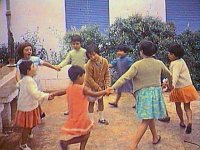 go was a
young man engaged to be married when he came accross an abandoned baby in the
streets of Bari. Moved by her plight he was determined to look after
her, but his fiancee was not so keen and said he must choose between her and the
baby. The Professor chose the baby and subsequently founded a home
for 36 little girls in the pretty town of Alberobello, famous for its Trullo
houses. It was a very remarkable venture despite the fact that the
bishop would not consecrate the chapel because he felt it was wrong for one man
to be looking after so many girls. In practice however the oldest
looked after the youngest and there were other staff. We gave
holidays to some of these children for several years. Interestingly
they went to Great Missenden where actress
Patricia Neal and wife of Raoul Dahl played an active part on the local
committee. The home still exists but
under different management.
go was a
young man engaged to be married when he came accross an abandoned baby in the
streets of Bari. Moved by her plight he was determined to look after
her, but his fiancee was not so keen and said he must choose between her and the
baby. The Professor chose the baby and subsequently founded a home
for 36 little girls in the pretty town of Alberobello, famous for its Trullo
houses. It was a very remarkable venture despite the fact that the
bishop would not consecrate the chapel because he felt it was wrong for one man
to be looking after so many girls. In practice however the oldest
looked after the youngest and there were other staff. We gave
holidays to some of these children for several years. Interestingly
they went to Great Missenden where actress
Patricia Neal and wife of Raoul Dahl played an active part on the local
committee. The home still exists but
under different management.
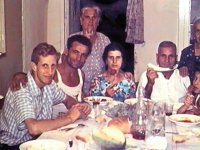
Danilo Dolci's work was
of a very different nature in the mafiosi areas of Sicily, trying to fight the
protection rackets that had grown up there. He went on a number of
well publicized hunger strikes at his home in Partinico. It was
fascinating to visit the houses of the children who had come over in the 1960s -
often only one room, with a couple of cows in an adjoining room - kept inside to
prevent them from being stolen. It was strange to revisit Partinico
in 2005. It had changed out of all recognition and seemed to have
quite an air of prosperity. The photo alongside shows the parents of
Concetta who came over in 1961.
The room behind the old lady contains the cows. Concetta herself
took the photo.
There were quite a
number of Tunisian refugees in Italy following Tunisian Independence in 1956 and
the rule of Bourguiba. Originally they
were in camps, but later were rehoused in Rome and other places. Our
representative there used to make up parties of needy children for a holiday in
England and below is an extract from a report she wrote.
(written 1966 by Eileen Walters)
Went to Carinari Camp yesterday and found them busy preparing for new
refugees from Tunisia. My visit was well worthwhile as all the parents
there were delighted at the news they are getting from England. It
seems their children are all well and happy and writing most
enthusiastically. Mr. Bellu (the father of two of the children in
England) proudly brought me a great sheaf of letters and newspaper
cuttings to wade through. His is the worst case in the camp. He's 63
and ill - unable to work and he receives 10, 000 lira (less than £6) a
month (though not even that regulary) to maintain his wife and four
children. The baby of 6 months has to have special baby food which is
supposed to be supplied free, but which never materialises. Often these
Bellu children just don't eat, so I'm sure this holiday is a miracle
for them. Apparently the mother cried for a couple of days, but now
that she's had such symphatetic letters she says this holiday has
really saved their lives. She's a dear tiny African woman - quite
young. Luciano hasn't written - maybe he can't write yet, and they have
not heard from his foster parents. They'd like to, if possible.
The
following account is about the background of two of the Borrelli boys who
came to England. The word Scugnizzo means "spinning top" and was
used of these boys because they were always on the move and had no permanent
place to go. It was written in 1962.
Luigi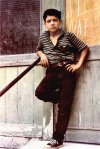
Luigi was a genuine
scugnizzo.
At the
age of eight he had left his
home at Pagani and walked
forty kilometres to Naples. At first he nearly starved
to death, but once
he joined the scugnizzi
his life became easier, for there is
mutual trust and sharing amongst the
members. From then on he learnt to
thieve and pickpocket, (he managed to
remove my watch off my wrist without
me knowing); he worked also for the black market, and learnt to attract
customers for prostitutes. In this
way he lived for over a year sleeping
on gratings in the street. Then Father Borelli found him. At first the call of the streets
was strong, but finally
he entered
the Casa
degli Scugnizzi to live with nearly
50 other urchins in an atmosphere of
love and trust so vital
to young children.
There are now 2 houses in
Naples
for the care of scugnizzi, and the money for maintaining them is obtained
by the children by collecting
and selling scrap
material, and
also through generous donations.
Pinto
Most children leave
home because there is
neither space nor love enough to
keep them there. But now that the Casa
degli Scugnizzi is established
many children can be
rescued before they
become fully engulfed in the vice of
Naples.
Six year old Pinto is one of these, who is now living in the
Casa. For him such a life has great
advantages, for he has the security
and love of the priests, he knows he
can trust his friends (which very few
Neapolitans can do), but at the same time he lives in and as part of the
life of the city itself. He goes to school
for at least an hour or two each day,
and there are plenty of opportunities
for sport and adventure.
And the following account, also written in 1962, similarly tells the background
of two Sicilian children selected by Danilo Dolci
Filippa
Filippa, a little
dark haired, ear-ringed girl of eight, lives in Partinico, a traditional
Sicilian town where one still sees Mules hauling painted carts - in fa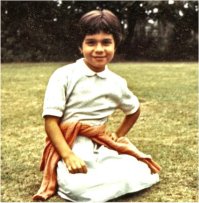 ct I had
to travel in one to get from the station to the town centre.
. Her house consists of one room which is typical for nearly all the
children we brought over and indeed in one house occupied by her friend Concetta,
there was an adjoining room where several cows lived., and
she sleeps in an outsize bed with her mother
and two sisters. Her father died recently, so she has to dress in black for
three years. Her family earn a little money preparing artichokes and tomatoes
for canning, an occupation which is
carried out in the home. Her mother is
strict with her-as Sicilian mothers are, and she does a large share of the
housework. However she goes to school until she's fourteen to learn to read and
write, and to sing folksongs. Toys are unknown to her, but, with her friends,
she plays traditional round games (like ring-a-ring o’ roses), can dance the
tarantella and she can swim. There is also now a childrens' playground in
Partinico. At first Filippa didn’t like English
food, had lice in her hair, didn’t like baths, and even complained that her new
coloured dress was the wrong length; but she made friends with so many people
that difficulties were soon forgotten. Indeed she returned home a very happy
little girl, full of wonderful experiences, and with the knowledge that there
are people in the world, who care about her welfare and happiness.
Years
later she wrote to me and asked me to send her a wedding dowry. I could hardly
send money out to an unknown address in Sicily, but I often wonder what happened
to her!
ct I had
to travel in one to get from the station to the town centre.
. Her house consists of one room which is typical for nearly all the
children we brought over and indeed in one house occupied by her friend Concetta,
there was an adjoining room where several cows lived., and
she sleeps in an outsize bed with her mother
and two sisters. Her father died recently, so she has to dress in black for
three years. Her family earn a little money preparing artichokes and tomatoes
for canning, an occupation which is
carried out in the home. Her mother is
strict with her-as Sicilian mothers are, and she does a large share of the
housework. However she goes to school until she's fourteen to learn to read and
write, and to sing folksongs. Toys are unknown to her, but, with her friends,
she plays traditional round games (like ring-a-ring o’ roses), can dance the
tarantella and she can swim. There is also now a childrens' playground in
Partinico. At first Filippa didn’t like English
food, had lice in her hair, didn’t like baths, and even complained that her new
coloured dress was the wrong length; but she made friends with so many people
that difficulties were soon forgotten. Indeed she returned home a very happy
little girl, full of wonderful experiences, and with the knowledge that there
are people in the world, who care about her welfare and happiness.
Years
later she wrote to me and asked me to send her a wedding dowry. I could hardly
send money out to an unknown address in Sicily, but I often wonder what happened
to her!
Antonio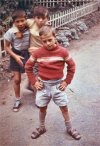
One of Filippa's friends is ten year old Antonio, who lives in a flat with his
brother and parents. His father works at an ancient trade, painting the brightly coloured carts which adorn Sicily, with stories of Saints and Paladins.
Antonio is fair haired, well built, but very thin. He eats
over eight pounds of bread, pasta and potatoes a week, and perhaps some fruit
and vegetables if he's lucky; but the cost of living is high-the peasants say
because of the Mafia. He never tastes butter or milk, and meat only very
rarely, so his diet is slightly deficient in protein
and in Vitamins A and C. Sicilian children
are often anaemic, easily tired, and easy victims of illness. The government try
to prevent both severe under-nourishment and serious epidemics of infectious
diseases, but health facilities and sanitation are still very inadequate.
Return to
Previous Page
I
 zi as it was called
being well established, he turned
his attention to a very much bigger problem which had insidiously arisen. Slums had been rife in
Naplcs,
and the State in a rather feeble attempt to got to grips with the
problem had delineated them into nine separate areas and built a wall
around each. Father Borrolli had always spent a lot of time in these
"baracche" as they are called, and frequently slept there, but it was
not until after 1960 that he began, by measures verging on civil
disobedience, to push the State into rehousing their occupants. This
work still goes on, but five areas have alrendy been
cleared. In Naples today there is less crime, less disease,
probably less unemployment and less homelessness. However, there are
still a large number of problems athough they arc not so dramatic in
nature. Rehousing itself is a problem, for frequently
these people have never had to keep a house before and have little idea
how to set about it. Families still have too many children many have no
alternative but to pass their daily lives hanging about the streets.
Schools are overcrowded and attendance is often irregular. . It is not
unknown for families to rent out their new flats while they themselves
returned to living in the slums.
zi as it was called
being well established, he turned
his attention to a very much bigger problem which had insidiously arisen. Slums had been rife in
Naplcs,
and the State in a rather feeble attempt to got to grips with the
problem had delineated them into nine separate areas and built a wall
around each. Father Borrolli had always spent a lot of time in these
"baracche" as they are called, and frequently slept there, but it was
not until after 1960 that he began, by measures verging on civil
disobedience, to push the State into rehousing their occupants. This
work still goes on, but five areas have alrendy been
cleared. In Naples today there is less crime, less disease,
probably less unemployment and less homelessness. However, there are
still a large number of problems athough they arc not so dramatic in
nature. Rehousing itself is a problem, for frequently
these people have never had to keep a house before and have little idea
how to set about it. Families still have too many children many have no
alternative but to pass their daily lives hanging about the streets.
Schools are overcrowded and attendance is often irregular. . It is not
unknown for families to rent out their new flats while they themselves
returned to living in the slums.



